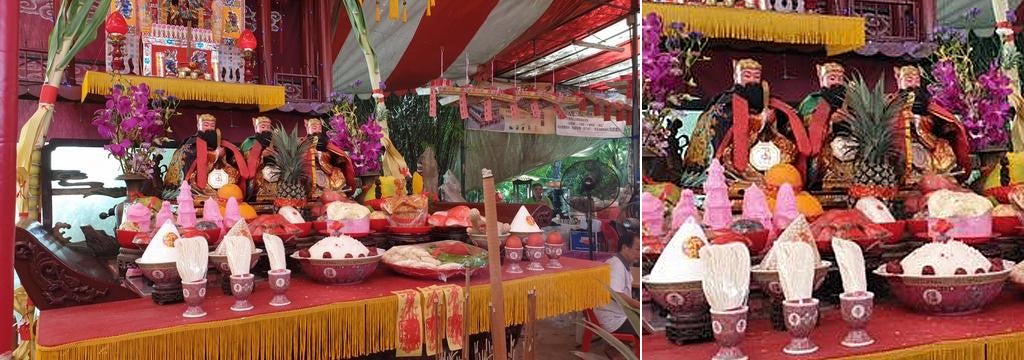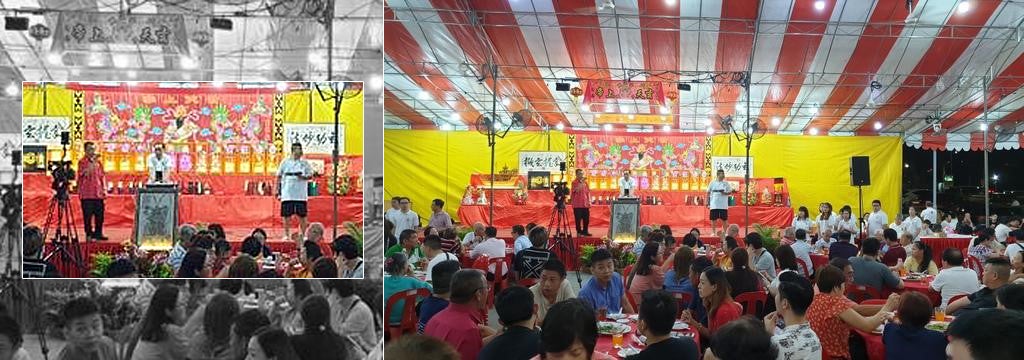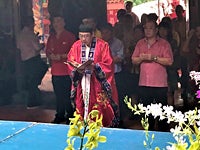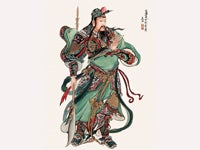Covid-19 and Its Impact on Local Temple Events and Related Economic Activities in Singapore
contributed by Victor Yue, 30 June 2020

The Jade Emperor Altar, Singapore, 22 May 2019. Picture taken by the author
In Singapore, temples and sintua 神坛 (private altars) usually host many activities, from the regular first and fifteenth day of the lunar month to the feast days of the Gods and other festivals such as Chinese New Year.
As most Chinese temples do not have a subscription based membership, they depend on public donations (tiam you 添油 in Hokkien) from devotees visiting the temples. Additional income is usually generated through sales of praying paraphernalia such as joss sticks, candles, and joss papers (kim zua 金纸). Bigger income might come during festive days, where devotees might place orders for “paper robes” for the deities, basket of flowers, and cooked food offering (sam seng 三牲). There could be sponsorships for performances such as puppet shows, street operas or getai 歌台, which might not generate any income. The biggest income is probably from temple dinners which come with auctions. For many temples, the amount of money collected from auctions could cover a major part of the temple’s annual expenditure.
There is an ecosystem of businesses that service the temples, from daily to festive needs. The retail shops also sell to the individuals for their home offerings. By looking at the various businesses, we could see how the closure of the temples during the “Circuit-Breaker” period has impacted them.
While some related businesses are adding online sales, such as the selling of joss papers, other smaller ones might not have the know-how or the infrastructure to do so. The Covid-19 situation would have started many thinking about it. Most of these shops do not have the expertise in online business. Their usual customers might not be tech savvy as well.
During the “Circuit Breaker” period, with all the temples closed and all major activities cancelled, there was no business for these companies. With social distancing becoming the norm, temples would have to consider how to organise their events, and manage the crowd. Given their small spaces, it could be a challenge. This in turn might impact the services and products needed for each event. These service and products providers might no longer be able to sustain their business as usual, but hopefully with some creative approaches, such businesses, especially the heritage-related businesses, could persevere.
Here is a list of businesses that in various ways depend on temple activities:
Praying related materials
- Joss shops (candles, joss sticks, joss papers, etc.): The bigger shops might do bulk business with the temples while other smaller ones in the neighbourhood shops cater to the residents.
- Big Joss Stick Makers for temple festivals: They cater directly to the temple who would order them for festivals. Usually temples would help to arrange for their devotees who want to sponsor such big joss stick sets.
- Paper structures (such as paper altars and houses): In temple events, there are usually the sets for the Jade Emperor altar. For some temples, they also make offerings to the “wandering souls” and they would have a big “paper house” for them.
- Fruits: Part and parcel of the offerings. In temple offerings, there would be 5 sets for each Deity. At home, most families would put one to 3 sets, depending on the occasions. In the home, traditional families would include fruits on days such as First and Fifteenth Day of the Lunar Month, and on the feast day of the Deities they worship at home.
- Flowers (bouquet): In some temple events, the temples might have flower banners and hanging baskets. Devotees could also buy small baskets of flowers as offerings to the Gods. At home, some families would buy flowers for offering as well.
- Tea leaves:On normal days, tea is offered to the Gods, in the temple as well as at home altars.
- Rice wine: On festive days, rice wine is also offered to the Gods. In traditional Taoist rituals, there will be a call for the offering of tea and rice wine to the Gods.
Entertainment
- Operas (Hokkien, Teochew, Cantonese, Hainanese): Depending on the temples, during festive days, the temples would engage their favourite operas. The genre of the operas depends to a certain extent on the origin of the temple and its devotees. Hokkien based temples are more likely to have a mix of Hokkien (these days gezaixi 歌仔戏) and Teochew operas. The operas are said to entertain the Gods, but in the old days, they were also entertainment for the devotees and the community.
- Puppets (Hokkien – string and glove potehi 布袋戏, Teochew – iron-rod, Henghwa – string, Hainanese – stick puppet): Smaller in scale and cheaper, the puppet shows have become more popular. There is also some spiritual significance in certain puppet performances, such as the Henghwa ones.
- Getai: Just as Gezaixi took over Gaojiazi 高甲戏, Getai has taken over operas over the years. Getai nowadays draw big crowds of all ages as the audience could understand and enjoy. With less people, especially the younger ones, understanding the other Chinese languages (dialects), the audience for operas has been greatly reduced.
- Lion Dance, Dragon Dance, Kirin Dance: Over the years, with more troupes in Singapore (Kirin Dance emerged only recently), there is always a demand for at least the Lion and Dragon Dance. It has now become an expected part of the event, if not for Yew Keng 遊境, then for the sending off of the Jade Emperor.
- Percussion Groups: Teochew percussions (Kong Kuan 公馆 ) and percussions for the temple mediums (Kim Kor Tui 金鼓队).
Taoist Priest Services
- Setup of temporary altars for the event: Most temple events would have a temporary altar set up for the rituals to be conducted by the Taoist Priests. The engaged Taoist Priest group would set up such an altar a day or two before the event.
- Hokkien, Teochew, Cantonese, Hainanese, Henghwa: Depending on the temple, Taoist Priests of different Chinese dialect groups would be engaged. The Teochew group is a unique one, not similar to the other Taoist Priest groups.
Food
- Kueh-kueh (pastries): Such as Ang Ku Kueh (Hokkien) and Yi Bua (Hainanese), they would be purchased depending on the dialect group of the temple or devotees.
- Special offerings: Such as the pink sugar figurines – Sam Sui 三兽 & Gor Siu 五兽, dry vegetarian dishes offerings, vegetarian offerings made of peanut.
- Cooked food: Sam Seng 三牲and Gor Seng 五牲 (combination of Duck/Chicken, Pork, Fish, Crab, Dried Cuttlefish, etc.).
- Fresh raw food (Freshly slaughtered pig and goat): These are very rare these days.
- Cooked dishes for the Birthday celebration and Feast of the Celestial Armies.

Temple dinner with auctions, Singapore, 2 Oct 2019. Photo taken by the author
Gathering
- Outdoor catering (usually temple dinners): This could be from 50 to 100 tables in each event, with each table having 10 people eating together.
- Drinks: Tea, soft drinks, beer, stout, wine.
- Auction items: There are some shops specialising in temple auction items which are usually held during temple dinners.
- Auctioneers: A unique activity during temple dinners, auctions are often in Hokkien with a mix of other languages. There is usually a team who will help in the registration and financial transactions with temple officials.
- Donation boxes for other charities supported by the temple: This is usually handled by the target charity, such as Kwong Wai Sui Hospital.
Infrastructure
- Tentage & flooring: Given the limited space, temples usually get permission from the Town Council to allow them to put up their events at a particular space.
- Plumbing: A temporary kitchen for cooking and washing is needed for temple members and devotees during the event, and for the outdoor caterers too.
- Tables & Chairs: Various sized tables would be required for various uses during the event.
- Generators: For some bigger events, the electricity from the Town Council might not be enough and so temples would have to rent generators.
- Lighting & Fans: These would be required throughout the event.
- Air-conditioners: There is a trend for temples to use air-conditioners or coolers, especially when there is a big crowd such as prayer sessions and the temple dinners.
- Flags and Buntings.
- Landscaping: As part of the altar setup, often, simple landscaping is included.
- Mobile Toilets: Depending on the scale of the event, there will be a need for the number of mobile toilets.
- Burning Cages: As a requirement, burning of the joss papers and paper houses would have to be made in such “burning cages”.
- Stage for Opera/Getai: Temples usually have to provide the stages, depending on whether they would be having an opera or puppet show, or getai, or all of them on different days.
- Stage for altar: The size and setup would be coordinated between the temple and the Taoist Priest group engaged to set up the altar.
Transportation
- Lorries & Coaches (for processions or visits to other temples or devotees’ house/office/factory): Before and after the event, temples would need to invite their Gods (statues and all) from the temple to the event site. For devotees, coaches would be required.
- Delivery (usually third party delivery companies would transport the materials): All the related businesses usually engage third party transport companies for the transportation.
Acknowledgement: The list is not exhaustive. It is compiled with the input of members of the Taoism Singapore Group on Facebook.
Victor Yue is interested in the cultural heritage in Singapore, particularly in the local Chinese temples. He visits temples to observe their events. He moderates an email list and Facebook group on Taoism Singapore.
Disclaimer: The views and opinions expressed in this article are those of the authors and do not necessarily reflect the position of the blog editorial team or the Asia Research Institute.
South Asia | Southeast Asia | East Asia | Other Places | Hinduism | Buddhism | Islam | Christianity | Other Religions



